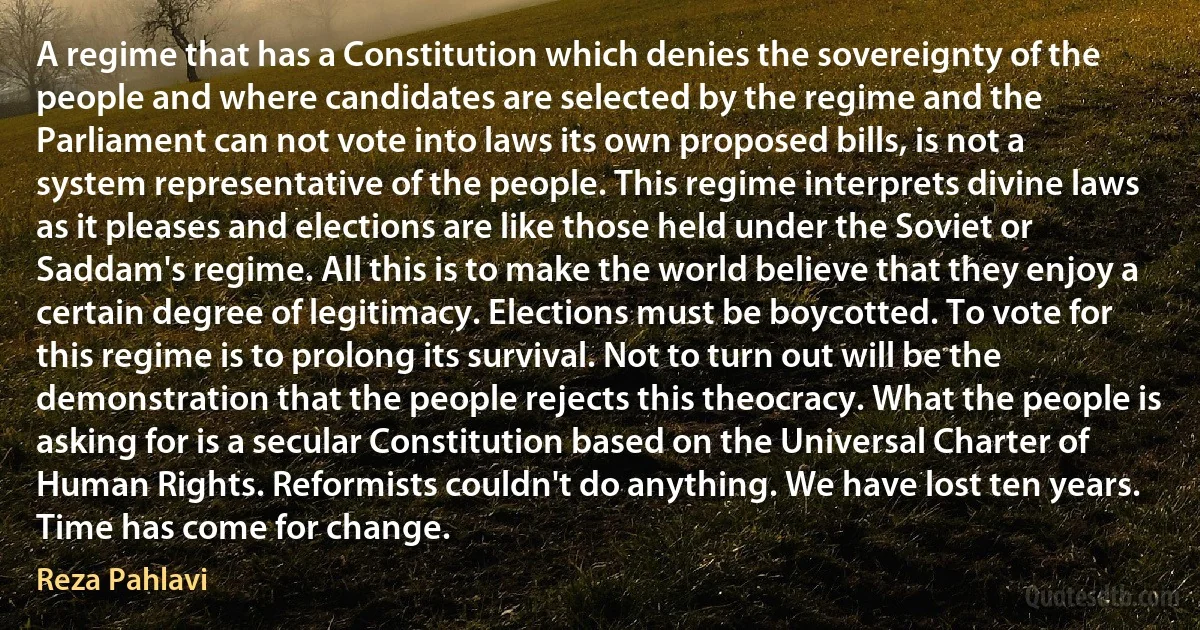
A regime that has a Constitution which denies the sovereignty of the people and where candidates are selected by the regime and the Parliament can not vote into laws its own proposed bills, is not a system representative of the people. This regime interprets divine laws as it pleases and elections are like those held under the Soviet or Saddam's regime. All this is to make the world believe that they enjoy a certain degree of legitimacy. Elections must be boycotted. To vote for this regime is to prolong its survival. Not to turn out will be the demonstration that the people rejects this theocracy. What the people is asking for is a secular Constitution based on the Universal Charter of Human Rights. Reformists couldn't do anything. We have lost ten years. Time has come for change.
Reza PahlaviRelated topics
anything asking believe certain change degree divine hold human legitimacy lost people regime representative secular sovereignty ten theocracy time turn under universal world years lawsRelated quotes
For what advantage is it, that the world enjoys profound peace, if thou art at war with thyself? This then is the peace we should keep. If we have it, nothing from without will be able to harm us. And to this end the public peace contributes no little: whence it is said, ‘That we may lead a quiet and peaceable life.' But if any one is disturbed when there is quiet, he is a miserable creature. Seest thou that He speaks of this peace which I call the third (inner, ed.) kind? Therefore when he has said, ‘that we may lead a quiet and peaceable life,' he does not stop there, but adds ‘in all godliness and honesty.' But we cannot live in godliness and honesty, unless that peace be established. For when curious reasonings disturb our faith, what peace is there? or when spirits of uncleanness, what peace is there?

John Chrysostom
Gentlemen! I too have been a close observer of the doings of the Bank of the United States. I have had men watching you for a long time, and am convinced that you have used the funds of the bank to speculate in the breadstuffs of the country. When you won, you divided the profits amongst you, and when you lost, you charged it to the bank. You tell me that if I take the deposits from the bank and annul its charter I shall ruin ten thousand families. That may be true, gentlemen, but that is your sin! Should I let you go on, you will ruin fifty thousand families, and that would be my sin! You are a den of vipers and thieves. I have determined to rout you out, and by the Eternal, (bringing his fist down on the table) I will rout you out!

Andrew Jackson
In spite of all the foregoing, there is a science of economics, a true, and even exact, science, which reaches laws as universal as those of mathematics and mechanics. The greatest need for the development of economics as a growing body of thought and practice is an adequate appreciation of the meaning, and the limitations, of this body of accurate premises and rigorously established conclusions. It comes about in the same general way as all science, except perhaps in a higher degree, i. e., through abstraction. There are no laws regarding the content of economic behavior, but there are laws universally valid as to its form. There is an abstract rationale of all conduct which is rational at alt, and a rationale of all social relations arising through the organization of rational activity.

Frank Knight
1. There is at present in the material world a universal tendency to the dissipation of mechanical energy.
2. Any restoration of mechanical energy, without more than an equivalent of dissipation, is impossible in inanimate material processes, and is probably never effected by means of organized matter, either endowed with vegetable life or subjected to the will of an animated creature.
3. Within a finite period of time past, the earth must have been, and within a finite period of time to come the earth must again be, unfit for the habitation of man as at present constituted, unless operations have been, or are to be performed, which are impossible under the laws to which the known operations going on at present in the material world are subject.

William Thomson
Should Congress, in the execution of its powers, adopt measures which are prohibited by the constitution; or should Congress, under the pretext of executing its powers, pass laws for the accomplishment of objects not entrusted to the government; it would become the painful duty of this tribunal, should a case requiring such a decision come before it, to say that such an act was not the law of the land. But where the law is not prohibited, and is really calculated to effect any of the objects entrusted to the government, to undertake here to inquire into the degree of its necessity, would be to pass the line which circumscribes the judicial department, and to tread on legislative ground. This court disclaims all pretensions to such a power.

John Marshall
